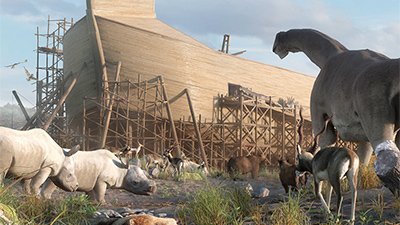
Not So Common Descent
If creationists accept “descent with modification” as a natural process, how are we any different from evolutionists? Roger Patterson, AiG–U.S., shows the important difference.
Dear AiG,
I want to first start this letter by saying how much I appreciate the work you are doing. I am finding your resources to be very helpful as I sort through various aspects of popularly accepted scientific theory. As a Christian, I love God and have always believed His word to be true. I also love science, especially biology, because I am fascinated by how the human body as well as how life itself works. Coming from a bible-believing Church, I have never been able to even vaguely believe that molecule to man evolution is true. But until now, I have not been able to defend my stance against evolution, so I want to thank you for giving me a scientific basis for my argument against it.
But, with that being said, I also have a question. In the resource I found on your website, Evolution Exposed-Natural Selection vs. Evolution, the author made the following statement:
Creationists agree with the idea of “descent with modification” but not with the notion of a single common ancestor.
I understand what the author is saying—to a certain extent. He is explaining that creationists do not agree with “descent with modification” as it pertains to molecule to man evolution. What I am not sure about is what he is saying he does agree with in terms of “descent with modification”. Forgive me if I seem a bit dense, but ever since middle school, I have been taught this idea only in dealing with evolution, so I am finding it difficult to separate the two. Can you please elaborate on how “descent with modification” is not solely an evolutionary idea and can be separated from evolution so that it agrees with God’s word? Your help would be much appreciated.
Sincerely,
—C.G., U.S.
Thank you for contacting us with your question. We are pleased to hear that our ministry has strengthened your faith and that you are thinking biblically about what you are reading and trying to discern the truth of the matter.
In making that statement, I was attempting to dispel a common myth that evolutionists use against biblical creationists. It is often claimed that biblical creationists believe that species have always been the same since Creation. This is a straw-man argument, as it does not accurately present our position.
Some evolutionists prop up this false understanding of the fixity of species and then show examples of speciation to suggest that the claims of creationists do not fit with what we observe in the natural world. Many are convinced by this argument, but these evolutionists have only managed to defeat an argument we haven’t made.
The idea that species change is observable in nature and in the laboratory.
The idea that species change is observable in nature and in the laboratory. We also read in Genesis 1 that the various plants and animals are created and reproduce “after their kind.” We understand this to mean that there are certain kinds that God created, not that these various kinds evolved over time from a common, hypothetical ancestor.
A passage in Deuteronomy 14 lists some of these biblical kinds and gives us some guidance in our understanding of the various kinds. Since various species can interbreed, we can conclude that those species are from the same created kind. The division is probably somewhere around the family level in our current classification systems. Chapter 2 of Evolution Exposed: Biology explains this idea in more detail.
So, within the created kinds, we see changes in characteristics over time—or “descent with modification.” That is a commonality in the biblical and evolutionary understanding of life on earth. The disagreement comes in the amount and direction of that change.
Let’s think about the deer kind for a moment. The deer kind (family Cervidae) includes moose, elk, whitetail deer, mule deer, muntjac, fallow deer, reindeer, and many other species. This includes a wide range of sizes, colors, and antler structures.
We also know from Scripture that representatives of the deer kind would have been aboard the Ark—otherwise, they wouldn’t be here today. As these animals spread across the globe after the Flood, they encountered different environments and climates. They also carried with them a complement of genes that had been placed in them by their Creator. Those genes were expressed in various ways in various environments creating new species of deer over time.
So, how is this not the same as evolution?
Evolutionary concepts of descent with modification ultimately require the addition of new information over time in order to get from a dinosaur to a bird, for example. The biblical model does not require new information. In fact, the biblical model is confirmed by the fact that we see a loss of information as these species adapt to various environments. This is what we would expect as the world continues to deteriorate after the Fall. (See “Is Natural Selection the Same Thing as Evolution?” in The New Answers Book 1.)
So, the characteristics we see in deer around the world today were present in the genetic makeup of the deer kind aboard the Ark. Thinking about antlers as a trait, moose have palmate antlers, mule deer have tined antlers, and caribou have a mix of both. From this we can reason that the original deer kind had a mix of these features, and, over time, some species lost the genetic information to make the palmate antlers (elk and mule deer) and some species have become primarily palmate (moose). This is the kind of change that is consistent with what we find in Scripture and the kind of change I was referring to in the book.
I hope that is helpful, and I trust you will continue to think critically about what you are reading—constantly comparing it to what Scripture teaches.
In Christ,
Roger Patterson
Recommended Resources

Answers in Genesis is an apologetics ministry, dedicated to helping Christians defend their faith and proclaim the good news of Jesus Christ.
- Customer Service 800.778.3390
- Available Monday–Friday | 9 AM–5 PM ET
- © 2026 Answers in Genesis







